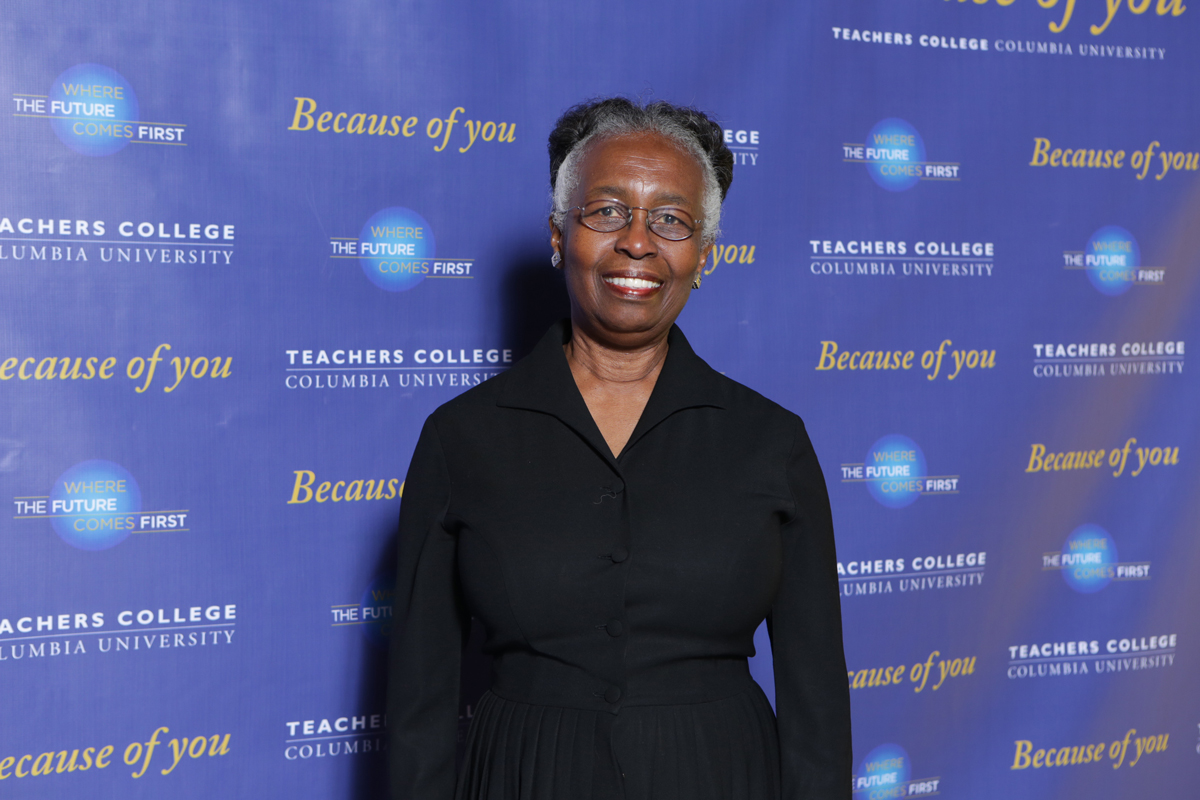“Active learning” is a term that describes Beverly Elmyra Johnson’s method for keeping her own teaching vital. She has been active indeed: Over the course of her career, she earned two master’s degrees from City College, in elementary education and counseling, and then master’s and doctoral degrees from Teachers College in Family & Community Education in 1983 and 1986, respectively.
“Getting theory helped me to be more creative in how I entered my classroom,” Johnson says. “It gave me more ideas about how to teach. I don’t necessarily need to know the name of every methodology, but I do need to know how to be creative in my own space. I credit Teachers College with that.”
Johnson chose her TC concentration in family and community education because she felt a personal stake in the subject matter: She’s the eldest of seven siblings. “You learn a lot about life in a large family,” she says. “Then I had friends on the block, and then I had school, and then I had a church community. All of these were factors in my growing up. That department just seemed to fit me.”
The deeper Johnson got into her coursework, the more she came to appreciate the interdisciplinary scope of TC. “I found that taking these courses gave me a broader vista from which to look at the world,” she says. There was a point where I was just in the classroom, but then I looked beyond the classroom, and there’s a big world out there. Teachers College prepared me for the broader world.”

CHAMPIONING ACTIVE LEARNING As both a teacher and learner, Beverly Elmyra Johnson (Ed.D. ’86, M.A. ’83) has sought a wider range of perspectives. (Photo: 5th Avenue Digital)
Johnson wrote her dissertation not on family, but rather on language in the classroom. “I used the books at TC, I used the books at the Butler Library,” she says. “I was all over the place. I loved it.”
Working as an elementary and middle school guidance counselor, Johnson wanted to make the wider world accessible to her students. She went searching in museum and college bookstores and filled her office with hanging mobiles, books and maps. She bought international flags from the United Nations gift shop. To get her students thinking and talking, she read fables and short stories with them and asked them questions. Together, they would find the location of a story on a map.
After completing her doctorate, Johnson decided to try her hand at university teaching. She became an assistant professor at Long Island University, teaching graduate and undergraduate courses on early childhood and elementary education. “You can’t just take in all that information,” she says. “You have got to exhale it.” Johnson went from teaching a kindergarten class on a Friday to teaching a graduate education course the following Tuesday evening.
“I said to myself, ‘How am I going to do this?’” Johnson recalls. “I said, ‘Beverly, just make believe you’re writing a paper: Read, write it down, then say it to the class in your own words.’
“But then, about six weeks into the course, one of the adult students came over to my desk, and she says to me, ‘You’re doing better,’” Johnson says, laughing. “That was really encouraging because I didn’t know what to do. But I just kept going, and I got better at it with time.”
Johnson taught at LIU for seven years and earned unqualified praise from both students and colleagues.
For Johnson, part of “exhaling” was writing for publication, an effort she undertook with the same intrepid spirit. She made a study of peer-reviewed education journals, then wrote to their individual specifications. Her first article was a review of Howard Gardner’s To Open Minds: Chinese Clues to the Dilemma of Contemporary Education, which appeared in the Capstone Journal of Education in 1989.
Retired since 2011, Johnson is still an “active learner,” taking courses and attending lectures, now through the Metropolitan Museum of Art and the New York Historical Society. She also enjoys taking flute lessons at the 92nd Street Y School of Music.
Johnson recently endowed a scholarship at Teachers College, a decision for which she thanks TC’s development staff. “I had been giving yearly, but I never thought of anything beyond that,” she says. “They informed me of something I could do. I have to admit, I wasn’t aware of all these ways you can help colleges.
“So just being informed was part of my growth experience,” she adds. “It enhanced my own professional development.”
